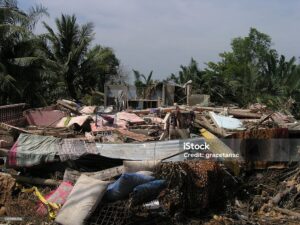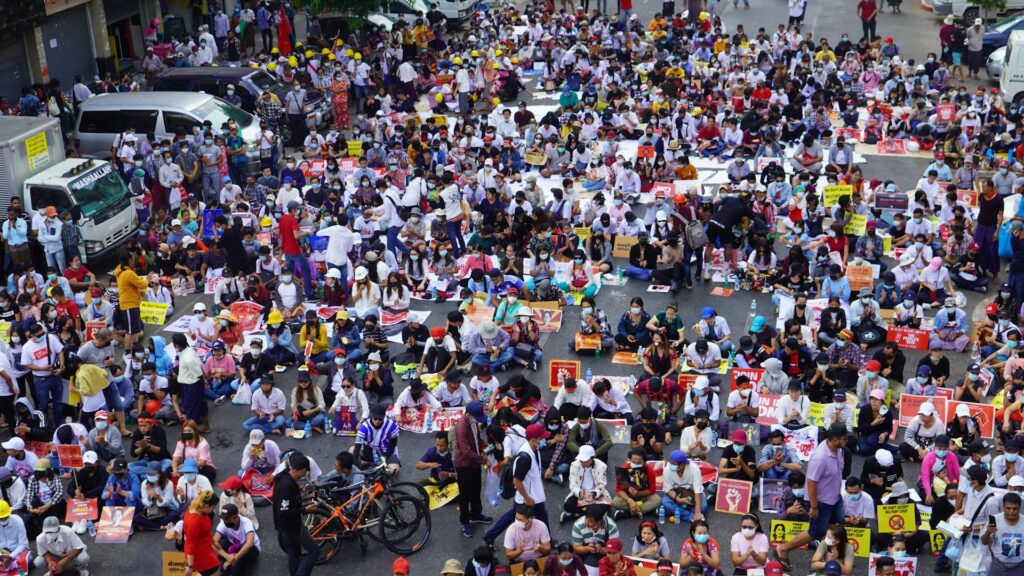The military coup in 2021 and its consequences
This Southeast Asian country has seen hard times for decades, mainly due to military rule and conflicts between various ethnic groups. In 2021, things took a heartbreaking turn when the military, known as the Tatmadaw, suddenly overthrew the government. This is a huge blow because only a few months ago the people voted overwhelmingly to keep Aung San Suu Kyi and her party in power.
People across Myanmar quickly took to the streets, hoping their protests would reverse the military takeover. But the military cracked down on them, using force and violence to silence the crowd. Thousands were imprisoned and many lost their lives. In response, opposition groups, including those representing ethnic minorities that had been marginalized for years, formed an alternative government called the National Unity Government (NUG). They even organized a defense force to protect civilians and resist the harsh rule of the military called the People’s Defense Force (PDF).
Since then, the situation has been bleak. The fighting has turned into a full-blown civil war, leaving millions displaced and struggling to find safety.
Human Rights Violations and Humanitarian Crisis
Military control over power is maintained through brutal repression. At least 4,000 civilians have been killed and an estimated 24,000 arrested since 2021. Arbitrary arrests, torture, and extrajudicial killings are widespread, especially in areas under martial law. The junta has set up closed « special courts » in prisons to hear political cases, denying prisoners a fair trial and handing down harsh sentences to those accused of opposing the regime. By 2023, the military’s use of heavy weapons escalated against civilian populations, including the use of thermobaric bombs and clustering, leading to countless civilian deaths. Air strikes have destroyed entire villages, especially in Sagaing, Kachin, and Karen, where ethnic armed groups are prominent. Myanmar’s ethnic minorities have long faced discrimination, and the coup has intensified attacks on communities such as the Rohingya, who continue to endure apartheid conditions.
The ongoing conflict has displaced over 2 million people internally, with around 94,000 seeking refuge in neighboring countries. Millions of people are in desperate need of aid as humanitarian operations are limited by a blockade imposed by the military junta. The United Nations reports that 18.6 million people, including 6 million children, need immediate assistance. In addition, Cyclone Mocha in May 2023 further exacerbated the crisis, destroying infrastructure and affecting nearly eight million people in several states.
Economic collapse and food shortages
Myanmar’s economy, once growing steadily, is now close to collapse. It contracted by 18% in 2021 due to rising prices, food shortages, and continued unrest. According to the UN World Food Program, farming has been hit hard by conflict and extreme weather, causing one of the worst food crises in the world. Poverty levels, already high, have worsened, making life even harder for millions. The World Bank’s May 2023 survey found that 48% of farming households are worried about not having enough food, up from 26% the previous year.
Burma’s also very vulnerable to natural disasters; since September 9, 2024, heavy monsoon rains and Typhoon Yagi have caused major floods and landslides in 70 townships across 11 states, affecting over a million people—60% of whom are women and girls—and resulting in more than 300 deaths.
The financial system is struggling due to limited access to banking services and a significant decline in foreign investment, primarily caused by instability and sanctions. Consequently, Myanmar’s economy is projected to have grown by only 1 percent for the year ending in March 2024, with businesses facing ongoing difficulties. In addition, spending on health and education has sharply decreased, falling from 3.8% to around 2% of GDP between 2020 and 2023, further reflecting the country’s economic challenges
International response
Despite sanctions from the U.S., and EU, and condemnation from the UN, Myanmar’s junta has faced limited coordinated international pressure, as China and Russia continue to back the regime with military and economic aid, undermining isolation efforts. And while the Association of Southeast Asian Nations (ASEAN), condemns the junta’s escalating violence and restricts its high-level participation, it remains constrained by its non-interference policy and the requirement for consensus among member states, preventing more decisive action.
At the recent ASEAN summit in Laos on October 9, 2024, Southeast Asian leaders renewed calls for Myanmar’s junta to take concrete steps to halt the violence, with Thailand proposing a consultation in mid-December to encourage dialogue. However, ASEAN’s influence is weakened by the junta’s defiance and the organization’s own structural limitations, casting doubt on the effectiveness of regional diplomatic efforts.










